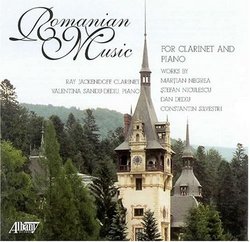| All Artists: Ray Jackendoff, Dan Dediu, Martian Negrea, Stefan Niculescu, Constantin Silvestri, Valentina Sandu-Dediu Title: Romanian Music for Clarinet and Piano Members Wishing: 0 Total Copies: 0 Label: Albany Records Release Date: 6/24/2003 Genre: Classical Styles: Chamber Music, Historical Periods, Classical (c.1770-1830) Number of Discs: 1 SwapaCD Credits: 1 UPC: 034061052920 |
Search - Ray Jackendoff, Dan Dediu, Martian Negrea :: Romanian Music for Clarinet and Piano
 | Ray Jackendoff, Dan Dediu, Martian Negrea Romanian Music for Clarinet and Piano Genre: Classical
|
Larger Image |
CD Details |
CD ReviewsPleasant Folk-tinged Romanian Music for Clarinet & Piano J Scott Morrison | Middlebury VT, USA | 10/02/2003 (4 out of 5 stars) "The clarinetist here, Ray Jackendoff, is a professor of linguistics at Brandeis (and co-author of a music textbook with composer Fred Lerdahl) who met his pianist partner Valentina Sandu-Dediu at a graduate study center in Berlin. While living in Berlin the two got together often for music-reading sessions for their own enjoyment. And from this chance occurrence arises the origin of this generally enjoyable disc devoted to piano-and-clarinet music by 20th-century Romanian composers, including a suite composed for them by Ms Sandu-Dediu's composer husband, Dan Dediu.The composers, none of them well-known in the US, are Martian Negrea (1893-1973, Suite for Clarinet and Piano, Op. 27 [1961]), Stefan Niculescu (b. 1927, Sonata for Clarinet and Piano [1954-55]), Dan Dediu (b. 1967, Forms of Farewell [after Wallace Stevens, 2000], and Sonata Surrealissima for Clarinet Solo, Op. 63 [1997]), and Constantin Silvestri (1913-1969, Sonata for Clarinet and Piano, Op. 19, No. 1 [1939]).The only music remotely advanced here are the two pieces by Dan Dediu. 'Forms of Farewell,' a four movement suite based on quotations from Wallace Stevens, is written in what one could call an edgy international post-Schoenbergian style. Although less obvious than in the other pieces recorded here, Dediu's music has a discernible tinge of eastern European folk music about it. The solo clarinet piece makes some judicious use of multiphonics and microtonal intervals. Both Dediu pieces are marked by rhythmic variety and an element of post-romantic melodic contours.All the other pieces, although clearly tonal, have obvious - to Western ears - exotic melodic and harmonic elements arising from Romanian folk music. None of them uses a language more advanced than that of, say, Bartók in his own folk-tinged works. I found both the Negrea and the Niculescu pieces to be charming and memorable. The sonata by Constantin Silvestri (remembered more as a fine conductor) is a constantly delightful, alternatively lively and pensive, neo-classic 17-minute three-movement piece that repays close listening.All of this music is played well by both musicians and is recorded in clear sound in a spacious acoustic. I spent a pleasant afternoon listening and re-listening to the CD; none of this is Great Music but each piece has its own merits. I imagine it will have its admirers, particularly among clarinet fanciers who don't, after all, have much opportunity to hear clarinet-and-piano literature on disc.Scott Morrison"
|

 Track Listings (20) - Disc #1
Track Listings (20) - Disc #1